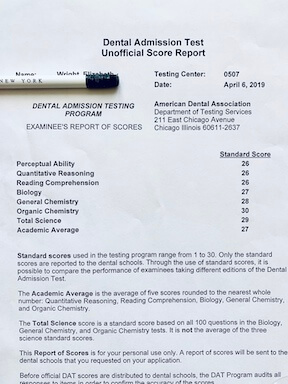Featured Student of June

Meet Lizzie, a happy DAT Bootcamp customer who recently conquered the DAT. I’ve asked Lizzie to share her DAT experience with us as the featured student of June.
As a student who was still taking classes, what were some challenges you faced preparing for the DAT, and how did you overcome them?
The most significant challenge I faced in this process was achieving balance, and I primarily addressed this by remaining extremely organized. Before studying, made a 10-week schedule based off of Ari’s, but condensed it to fit my schedule taking class, extracurriculars, and homework into consideration and adjusted it to focus more on my weaknesses. During my month of practice exams, I kept a detailed log of my scores and the dates I took each exam in an excel sheet so I could directly track my progress. If any subject was especially weak, I made sure to dedicate more focus to it by going back to the basics and reviewing the material. An important note is that the DAT focuses much more on foundational knowledge than small details, and I believe my emphasis on gaining a solid foundation in the sciences lead to my success in those subjects (along with a lot of hard work). I also had learned about a productivity method called time blocking, which many entrepreneurs use to structure their schedules. This focuses allotted periods of time or certain days to certain responsibilities or projects in order to best maximize time and focus. I was lucky enough to be able to schedule all of my classes each week into a few days, and even though this at times meant being on campus from 8 AM to 9 PM, I was able to focus the entirety of my energy to school-related responsibilities on those days. I then subsequently had around three to four days per week of uninterrupted time I could dedicate completely to the DAT, which was extremely effective for my productivity.
What advice would you have to other students working or taking classes while studying for the DAT?
It can sometimes be unavoidable, but I went through initial periods of guilt when I was dedicating time to school versus my DAT preparation. It’s important to keep in mind that though the DAT is extremely important, your GPA is too — it is absolutely beneficial to postpone your exam date if achieving a balance between school/work and the DAT is becoming too overwhelming, rather than let your grades slip while going into the exam unprepared and ending up needing to retake it down the line. I also want to emphasize that this entire process requires constant adjustment, and it is really most important to listen to yourself and what works best for you. I read numerous study breakdowns from others during the process, but I used them mostly as motivation or encouragement rather than direct outlines of what exactly I needed to do to score well. Though taking practice exams is extremely crucial and absolutely necessary in my opinion, this process is really about quality over quantity. It was more effective for me to spend the majority of my time reviewing my mistakes and the explanations Bootcamp provides than doing thousands more practice problems from every DAT resource out there. Catering to a restricted schedule may very well mean you get to do less practice than others, but I actually don’t believe this is an absolute disadvantage when paired with sufficient review and utilizing the Bootcamp resources efficiently.
What is something you would have changed to help your study schedule go more smoothly?
I would have begun learning the topics in biology that were most unfamiliar to me, such as anatomy and physiology and reproduction/development, earlier in the process. This would ideally mean that when it came time to addressing these broad topics for the DAT, the process would be more of a review since biology was by far my most daunting subject. This would have probably given me two extra weeks to dedicate to the subjects I allotted much less time to than the sciences, such as PAT and math.
My SND username is Lw1996, and I’m super open to answering any questions.
- Biology27
- General Chemistry28
- Organic Chemistry30
- Reading Comprehension26
- Perceptual Ability26
- Quantitative Reasoning26
- Academic Average27


